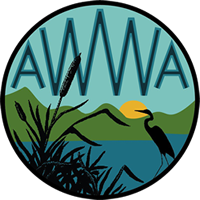On Friday December 7, the Piscataqua Region Estuaries Partnership (PREP) held the 2013 State of Our Estuaries Conference at the Portsmouth Harbor Events Center. The “State of Our Estuaries” is a report that was first published in 2000 and is published every three years to “examine the environmental indicators of estuarine health, such as bacteria levels, nutrient concentrations, toxic contaminant levels, abundance of shellfish, and land use in the coastal watershed.” The report allows for a long-term data collection and reporting to assess the health of Maine and New Hampshire estuaries.
The conference kicked off with registration and mingling from 8 to 9 AM. By 9 AM the room was filled with eager attendees ready to hear what the report would detail. The keynote address was given by Ben Grumbles, President of the US Water Alliance. The US Water Alliance awarded the US Water Prize to the Salmon Falls Watershed Collaborative in 2012 for their excellent work toward water sustainability.
 Salmon Falls Watershed Collaborative members.
Salmon Falls Watershed Collaborative members.
(photo courtesy PREP)
Mr. Grumble’s talk outlined the importance of conducting science in a day and age with growing numbers of people and water shortage concerns.

Ben Grumbles of the US Water Alliance gives the keynote address.
(photo courtesy of PREP)
Mr. Grumbles was followed by Rachel Rouillard, the PREP Director, Philip Trowbridge, PREP Coastal Scientist, and Stephen Jones, PREP Technical Advisory Committee and UNH Jackson Lab who set the stage for the day of panel discussions.
The remainder of the morning was dedicated to “Collaborating on Solutions for the Seacoast”. Much of this panel was discussion was over land conservation to protect drinking water, wildlife, recreation, agriculture, historic sites, local foods, and buffering estuaries from land uses.
After lunch the day really got going. AWWA’s Executive Director, Linda Schier, and AWWA treasurer, Jon Samuelson, gave a riveting talk on watershed work at the local level. Focus on our YCC program and 7 years of success stories in protecting the headwaters of the Salmon Falls River. The Director of Planning and Development of the City of Somersworth, Dave Sharples, followed up the AWWA talk with more “shovels in the ground” or, as he paraphrases, “where the rubber meets the road”. Mr. Sharple’s talk focused on local municipal efforts to protect surface and groundwater resources. The finale of the “Collaborating on Solutions for the Seacoast” section was Forrest Bell of FB Environmental. Mr. Bell talked about “Using Science and Landowner Engagement to Restore Clean Water for Spruce Creek in Maine”.
After a short break the session continued with a focus on restoring our bays and rivers. These talks focused on restoring salt marshes, oyster reefs, urban streams, and engaging the next generation of coastal stewards. Talks were given by David Burdick (UNH Jackson Estuarine Lab), Angela Manning-Welch (New Franklin School), Ray Konisky (The Nature Conservancy), and Thomas Ballestero (UNH Stormwater Center).
The final discussion was a panel session designed to talk about the importance in investing in clean water and clean water infrastructure. Talks included Investing in Long-Term Monitoring and Directed Research by Jonathan Pennock of UNH, Water Infrastructure Needs/Investemnt by John Boisvert of the Pennichuck Water Works, INC., and closing out the day was PREP partner and owner of Smuttynose Brewing Company, Peter Egelston. Mr. Egelston went off the cuff for 15 minutes talking about the importance in our water quality, our infrastructure, and the importance in investing in our future.
 The final panel presenters from left to right: Peter Lamb, Peter Egelston, John Boisvert, and Jonathan Pennock.
The final panel presenters from left to right: Peter Lamb, Peter Egelston, John Boisvert, and Jonathan Pennock.
(photo courtesy PREP)
A phenomenal day packed full of topics important to us all. Whether you are living far inland or right on the coast, you use water and contribute to water health as everything that happens upstream eventually comes down stream.
